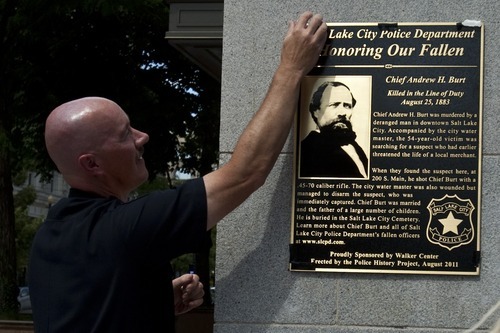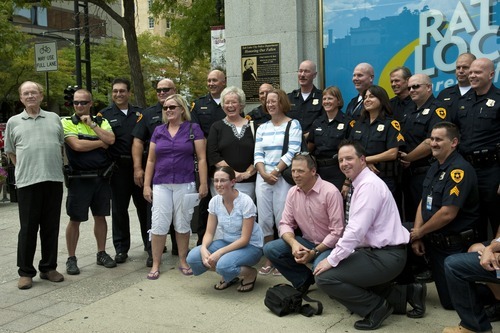This is an archived article that was published on sltrib.com in 2011, and information in the article may be outdated. It is provided only for personal research purposes and may not be reprinted.
At high noon 128 years ago, the late-summer sun bore down on Salt Lake City Marshal Andrew H. Burt as he went out on what would be his last watch.
On Aug. 25, 1883, Burt's lunchtime visit with the city water master was cut short by a disturbance call that ended in bloodshed as the officer was gunned down by a man with a rifle.
Fast-forward to Thursday, when Salt Lake City police officers and nearly 10 relatives of Burt met on the corner of 200 South and Main St. — the site of the slaying — where owners of the Walker Center publicly placed a bronze plaque on the building's wall honoring Burt's sacrifice in the line of duty.
Steve Diamond, a retired Salt Lake City police lieutenant and a great-great-grandson of Burt, said the plaque reminds him of more than just family — he recalls watching a partner killed in the Avenues in 1973.
"I have seen that [sacrifice] every day of my life," Diamond said, beginning to tear up while pointing to the plaque. "It is not just him personally, it is the whole thing."
Diamond hopes people who see the plaque realize the sacrifices officers make everyday.
Salt Lake City Police Chief Chris Burbank said that in the future at least 19 other officers will be honored for their service with similar plaques.
"Not [only] for the fact they were killed in the line of duty, more importantly we recognize these individuals for their contribution to society," Burbank said Thursday.
Robert Kirby, a former police officer and author of End of Watch, a book chronicling stories of Utah's murdered police officers from 1858-2003, was on hand Thursday to recount the story of Burt's death.
"Today in Utah we have lost 133 police officers in the line of duty; today we honor one of the first ones," Kirby said.
Burt, a 54-year-old family man, went looking for an African-American man known as Sam Harvey man who had reportedly pulled a pistol on a restaurant owner. Kirby said Harvey fled the restaurant and purchased a .45-.70 caliber rifle.
According to End of Watch, Burt "rarely carried a gun, preferring to wade into any fracas with a heavy walking stick."
But this time, the unarmed veteran officer found himself overmatched. Harvey fired fatal shots that hit Burt in the arm and chest.
Responding officers disarmed Harvey and arrested him.
Soon after, an angry mob gathered outside the jail demanding Harvey's death. And less than an hour after Burt had been killed, the mob stormed the jail and lynched Harvey.
"In one of the darker episodes of Utah's history, [the mob] dragged [Harvey] around the streets for a while until the mayor came out and told them to stop," Kirby told the crowd.
Jason Christensen, of Riverdale, learned from a relative who had done genealogy work that Burt — a polygamist — was his great-great-grandfather through Burt's third wife.
Christensen grew up hearing stories that Burt was "a big wig with Salt Lake City police," and "he was a gentle man ... [who] always strived to use diplomacy in the way he approached the bad guys."
Burt was not armed when he was killed.
"It is nice to have a place honoring him right where it happened," Christensen said, adding that he feels glad to call him family. "There is an element of pride in knowing that he gave his life" while serving the community.
Twitter: @CimCity





